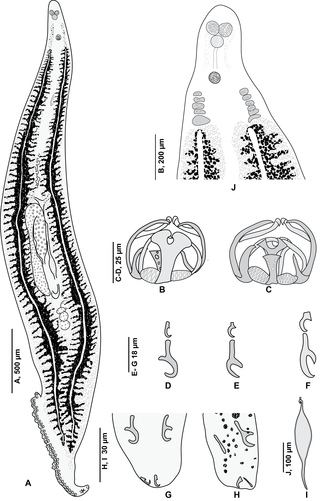
Rhadinorhynchidae is a family of parasitic worms from the order Echinorhynchida.

Heterophyidae is a family of intestinal trematodes in the order Plagiorchiida.

Mazocraeidea is an order of flatworms in the subclass Polyopisthocotylea within the class Monogenea.

Microcotyle is a genus which belongs to the phylum Platyhelminthes and class Monogenea. Species of Microcotyle are ectoparasites that affect their host by attaching themselves as larvae on the gills of the fish and grow into adult stage. This larval stage is called oncomiracidium, and is characterized as free swimming and ciliated.

The Diplectanidae are a family of monopisthocotylean monogeneans. They are all parasitic on the gills of fish. Diplectanids are small animals, generally around 1 mm in length. As parasites, they can be extremely numerous, up to several thousand on an individual fish.

Boris Yevseyevich Bychowsky was a Soviet scientist and parasitologist, specialist of fish parasites, especially monogeneans. He was director of the Institute of Zoology of the Academy of Sciences of the Soviet Union in Leningrad (1962–1974). Bychowsky is the author of more than 100 scientific publications, mostly on systematics of monogeneans. His most famous work was his monography on monogeneans (1957), which was translated into English in 1961.

Diclidophoridae is a family of monogeneans within the order Mazocraeidea.

Microcotylidae is a family of polyopisthocotylean monogeneans. All the species in this family are parasitic on fish.
Cainocreadium is a genus of trematodes in the family Opecoelidae. It has been synonymised with Apopodocotyle Pritchard, 1966, Cainocreadoides Nagaty, 1956, and Emmettrema Caballero y Caballero, 1946.
Opegaster is a genus of trematodes in the family Opecoelidae.

Ancyrocephalidae is a family of monogenean flatworms. The family is considered as a "temporary name" in WorMS but includes a large number of genera and species.
Microcotyle cepolae is a species of monogenean, parasitic on the gills of a marine fish. It belongs to the family Microcotylidae.
Microcotyle tanago is a species of monogenean, parasitic on the gills of a marine fish. It belongs to the family Microcotylidae.

Pseudaxine is a genus which belongs to the phylum Platyhelminthes and class Monogenea; all its species are parasites of fish.
Gastrocotylinae is a sub-family of polyopisthocotylean monogeneans. All the species in this family are parasitic on fish.
Cynoscionicola is a genus which belongs to the family Microcotylidae and class Monogenea. Species of Cynoscionicola are ectoparasites that affect their host by attaching themselves as larvae on the gills of the fish and grow into adult stage. This larval stage is called oncomiracidium, and is characterized as free swimming and ciliated. This genus was proposed by Price in 1962, to accommodate Cynoscionicola heteracantha and Cynoscionicola pseudoheteracantha . Members of Cynoscionicola are characterised by a genital atrium with two anterior muscular pockets armed with single row of hooked spines, and two posterior lateral muscular pouches armed with spines.

Microcotylinae is a subfamily within family Microcotylidae and class Monogenea. This subfamily was created by Taschenberg in 1879.
Cryptogonimidae is a family of trematodes belonging to the order Plagiorchiida.
Calceostomatidae is a family of flatworms belonging to the order Dactylogyridea.
Haliotrema is a genus of flatworms belonging to the family Ancyrocephalidae.










